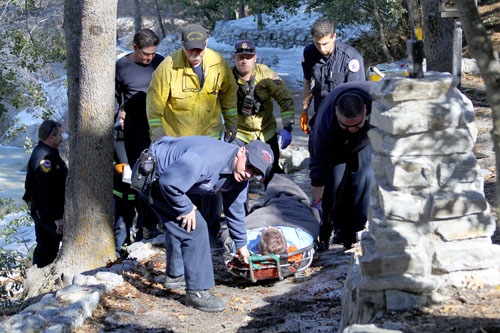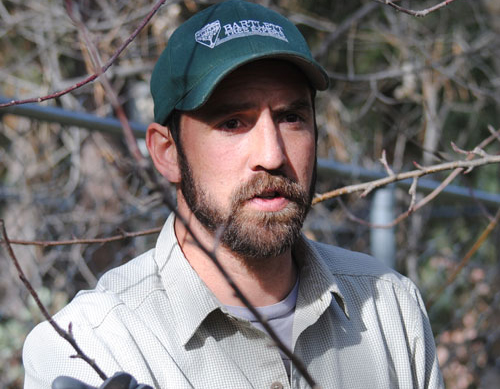Wednesday, May 24, Riverside County 4th District Supervisor V. Manuel Perez held his third recent listening session at Town Hall as he and the community become acquainted with each other. It was the second one dedicated to Idyllwild’s short-term rental (STR) situation and the amendment of Ordinance 927.1. As before, Planning Director John Hildebrand and members of the local STR Committee Jon Brown, Woody Henderson, Anna Duitruk and Mark Dean joined him. Committee members Jane Oliver and Joel Feingold were unable to attend. Other county officials present included representatives of Transportation and Land Management, Code Enforcement (CE), Sheriff’s Department and Idyllwild Fire Chief Mark LaMont. The hall was mostly full, but not as crowded as previous sessions.
In the three meetings so far, comments have circled around a number of issues: Neighbor complaints of noise, nuisance and road blockage, fire evacuation concerns, and the loss of the real but hard-to-measure value of having actual neighbors. On the other side of the ledger, STR proponents espouse their economic benefits, not just to owners, but to housekeepers and other support crew, and downtown businesses. Owners spoke of their right to benefit from their investment, the unfairness of the STR certificate moratorium, and attribute the problems to a few badly managed STRs. Owners and realtors expressed concern with the “bust” that has followed the COVID-related “boom,” and suggest that the market will correct the density issue. Many speak of how STR income allows them to realize the dream of owning a cabin in Idyllwild, and those who came here before ask the STR owners to consider how that affects the “dreams” of long time, often retired, neighbors.
Perez’ opening comments acknowledged that not all attendees may feel comfortable filling out speaker forms with personal contact information. He said the forms could be filled out anonymously and all would be read. Wishing to hear from people who had not previously spoken, tonight he would recognize speakers from back to front.
The supervisor discussed his thinking about changes to the ordinance. He said he was “leaning toward” a cap on new STRs, but was unsure of numbers, and supports better enforcement, with an “actual sheriff,” especially after 10 p.m.: “one (deputy) sheriff full-time and maybe another part-time to back him or her up.” This officer should be able to “hand out strikes,” fines and penalties that could escalate to loss of license. Perez said he hoped to finish work on the ordinance by September and would like to see the moratorium on new STRs lifted in Mountain Center “even sooner.” In previous sessions, STR owners from there maintained that they do not have the density problems Idyllwild has.
Perez said new enforcement, either CE or sheriff, should be paid out of TOT taxes (10% in the unincorporated county) and he is looking at the amount of tax money coming out of the area. He has asked the tax collector to provide these numbers; that promises to be a coming attraction for the next session. “Making sure that that money stays here” was the supervisor’s applause line.
CE gave an update on notifications for STR owners. With 1,300 STRs in the county, and approximately 500 in this area, “we are working toward, by the end of June, notices for parking and signage … that everybody’s been put on notice that is in violation, and then from there we’ll work forward on the enforcement.” Asked for clarification, the officer said CE counts 501 STRs for Idyllwild “in the system” and 20 “Notices of Violation” going out for unregistered units. In response to a question about motels having or being counted as STRs, Hildebrand explained that motels are zoned as commercial properties and are outside the STR system. They are often advertised on the same platforms as residential STRs, leading to some confusion for citizens trying to count them.
Brown asked about the 24/7 nature of nuisance issues, and was told CE’s hours are until 10 p.m., and that complaints have to be ongoing, repeated problems, like a late-shift resident who blasts loud music at predictable times, for CE to “flex-shift” and respond outside normal hours.
Hildebrand addressed a common complaint from STR owners: not receiving notifications from the county. He said many accounts include incorrect addresses and contact information in the system created by their “previous partners,” and this information is migrating to the new system (run by Deckard Technologies). STR owners need to visit www.RCTLMA.org/shorttermrentals and open an account. Only 40% of STR owners have activated an account. Renewal notices mailed out have been returned for bad addresses, including property address instead of PO box. Later, during public comments, the CE officer explained that logging in and entering their information is “a requirement” for all STR permit-holders, and that the county does not enter information on paperwork into the system.
Public comments began with an STR operator pointing to “many more issues beyond” the bad addresses. Having paid on time, he received “several notices in the mail saying I am at risk of losing my permit.” Calling in, he was told the office was overwhelmed and that he could safely ignore the notices. “It’s great to hear the flexibility in the county …” but the ordinance is “confrontational” and the threats “stressful.”
Hildebrand acknowledged the system has problems and said a new version of the online payment system is being tested and would be available this week. The same operator asked about inspections. Their impression was that an operator may be given a half-hour notice to be present for an inspection. The CE official clarified that there is a one hour required response time for the “listed contact individual” for complaints.
CE reaches out to that person to schedule inspections, trying to fit several in the area for each trip. The 60-minute response is still a “fall back” if an operator repeatedly delays and misses appointments but is “not the norm.” A later question elicited a clarification: Inspections are exterior only, to verify the listed parking, the contact signage, and the presence of a noise meter. They are not health and safety inspections.
A citizen who identified themselves as a “disabled veteran from the Vietnam era,” described his situation living on an unmaintained road with 10 houses, five of which are STRs. “There’s no fire lane on that road …” Support crew “workers who have five or six different trucks,” and “five propane trucks a month” not only block but damage the road.
“I don’t see any of those houses compliant with the Americans with Disabilities Act.” He said businesses need wheelchair access, many have added ramps and larger bathrooms. Why not STRs? Perez asked for and noted the name of the road. One STR operator offered that Airbnb and other platforms included ADA information, but the veteran was not placated.
STR operators present said regulations for outside investors do not fit locals with a spare cabin, while those who manage a string of STRs argued that absentee individual owners are less responsive to complaints than full-time managers. A neighbor who floated the idea of banning owners from LA or other urban centers was countered by an STR owner who brought up the Fair Housing Act. Several speakers who identified as responsible STR owners said they “vet” their renters carefully.
Several speakers mentioned a “three strikes” approach, suggesting that increasing fines for violations should lead to loss of certification. Ordinance 927 includes this language: “The responsible operator of a short term rental shall report any such complaints, and their resolutions or attempted resolutions, to the Riverside County Planning Department within two business days of the occurrence. Failure to respond to complaints, meet a code enforcement officer within sixty (60) minutes, or report complaints to the planning department within two business days of the occurrence shall be considered a violation of this chapter, and may constitute cause for revocation of the short term rental certificate.”
This has not come up yet in the meetings — that owners must notify the county if they receive complaints from neighbors, even if those complaints are resolved, and “may” lose their license if they fail to do so. It should be noted that this penalty would only come after an “administrative hearing.” The ordinance otherwise refers problems that the owner/operator/contact person fails to remedy to the sheriff, reserving “all administrative, legal and equitable remedies available to the County for failing to respond within 60 minutes.” The fines for “administrative citations” issued for violations are $1,500 for the first, $3,000 for the second and $5,000 after that. The county has, in response to written requests by citizens and the Crier, and questions at these meetings, not yet provided an answer to these questions: Have any fines been issued to Idyllwild STR owners, and if so, how many?
Another recurring theme has been the STR market cycle: In addition to property owners whose plans were frustrated by the moratorium, there are those who obtained a permit only to watch their occupancy rates drop. At the last STR meeting, Martha Sanchez of Idyllwild Vacation Cabins spoke of occupancy over 70% during the pandemic, and 28% now. Marge Muir, perhaps Idyllwild’s longest-serving Realtor, said she had spoken with three people in the last few days who told her they could no longer hold on to their STR properties because of falling revenue.
Shane Stewart, identifying himself as owner of Idyllwild Realty and one of the town’s largest landlords, echoed this, calling the last two years “an anomaly.” He noted the highest vacancy rates he has seen as a landlord, attributing this to an exodus of STR support workers moving on as occupancy falls and owners sell, this in turn hurting other businesses.
Another STR owner dismissed the idea that banning or limiting STRs would bring down long-term rents, claiming communities who had capped or eliminated them had seen no such decline. Others mentioned fire insurance and the legal environment for landlords as greater drivers of high rents.
LaMont answered the concerns of those who invoke Paradise, California, and the 86 people who died in the Camp Fire there. He attributed the success of Idyllwild’s three full evacuations since 1996 to “decades and decades of planning.” He directed the public to the Mountain Area Safety Task Force (MAST) and its ”Evacuating to Safety” pamphlet, available at the fire department office. He said that while MAST meetings ceased to be public during COVID, the local, state and federal fire and law enforcement agencies continue to meet quarterly to update prevention and evacuation plans. These plans include the ability to “shelter in place” people and vehicles in a variety of locations, including the highway itself. LaMont also said that contrary to what some members of the public tell him, the department has not seen an increase in calls due to STRs. He attributed most of last year’s 11% increase to this winter’s “beneficial snowpack.” In parting he asked, or pleaded, for all homeowners to do their abatement.
Feingold told the Crier that the committee held a Zoom meeting with county representatives Tuesday, May 30, and there is one more Zoom session scheduled in two weeks. At this point, there is no mention of another Town Hall meeting.





